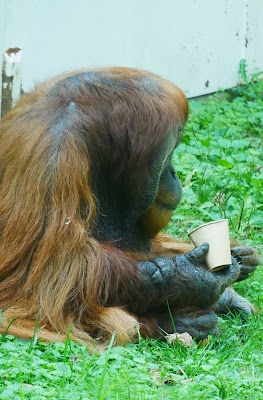This sort of "Habi-trail" of overhead pathways offering, in particular arboreal species, a way to have a more natural interaction with their environment was pioneered at the Philadelphia Zoo. A response to its limited foot print. Today, zoos all across the country and world utilize this sort of enriching design from the lesser primate trail at the Maryland Zoo in Baltimore to the Tiger trail at the Jacksonville Zoo in Florida and many more.
Having said all of that, today the pickings at the Primate House of the Philadelphia Zoo were rather thin, yet no less deep. Of all of the possible players only the White-handed Gibbons and Sumatran Orangutans were out and about. And of all of the other species, these are the two wherein new births have occurred this year.
FAMILY DRAMA #1
1) Mercury (Male, born in 1989 - 35 years old)
2) Phoenice (Female, born in 1990 - 34 years old)
While both have surpassed the average life-expectancy of a White-handed Gibbon in the wild (30 years), without the myriad of threats and constant care, they are actually only middle age. White-handed Gibbons in captivity average a life of 50 years!
The pair has been there for decades. Their tenure has also been a very productive one vis a vis offspring. Their newest baby is Eros, born on March 14 of this year. He joins five other siblings!--Four other males and 1 female. There oldest son, Leo, resides at the Columbus Zoo and Aquarium in Ohio. His next in line brothers, Aires and Orion call the Point Defiant Zoo in Takoma, Washington home. The next closest siblings, Polaris (male) and Ophelia (female) are part of the troop at the Philadelphia Zoo. Today, Mercury, Phoenice, Polaris and little Eros were hanging out in the large interior habitat usually home to the Sumatran Orangutans. With so much space and so many ways to jump and swing around, it was hard to get a picture in edgewise. Young Eros' independence reminded me of our little Lola, a Chimpanzee born at the Maryland Zoo back in the summer of 2019 to first time mom, Bunny. Both have a fearless independence when it comes to the limitations of gravity!
WHITE-HANDED GIBBON
Hylobates lar
Conservation Status: Endangered
Eros and his mother, Phoenice. White-handed Gibbons are dimorphous: the mature males and females express different coloration. All are born with a dark brown coat. Females at the age of menstruation fade to a blond beige color. Other lesser primates like South American Howler Monkeys do the same.
Dad, Mercury, anticipating a problem, over-scales Eros on the mesh to keep him from climbing too high. Watching these two parent him was utterly worth the price of admission.
Older brother, Polaris, watching from the habitat floor after discovering treats hidden in wadded up brown paper, an enrichment technique to help the gibbons experience what it is like to "find" their food.
FAMILY DRAMA #2
The zoo's pair of Sumatran Orangutan's successfully bred and gave birth to a male child on June 26, 2024. After the birth the newborn's parents were separated as a precaution against the father's possible negative reaction. So for the past 21 days, 28-year-old male Sugi was isolated from 31-year-old Tua to allow for mother and son to bond.
The day I visited just happened to be the first day the Sugi and Tua with newborn son, Jambi, were all together again. I arrived shortly after everyone got outside, and Tua had taken Jambi with her way up into the mid-section of a giant Sycamore tree that is the center piece of the outside habitat. Sugi isn't a good climber. So he was naturally unhappy with her choice of venue. He hollered at her. She ignored him. Finally, he loped off to an edge of the habitat to pout and watch. Once she was comfortable with his decision to give her space, she shimmied down from the tree with the help of a well secured strip of old fire hose.
The zoo's pair of Sumatran Orangutan's successfully bred and gave birth to a male child on June 26, 2024. After the birth the newborn's parents were separated as a precaution against the father's possible negative reaction. So for the past 21 days, 28-year-old male Sugi was isolated from 31-year-old Tua to allow for mother and son to bond.
The day I visited just happened to be the first day the Sugi and Tua with newborn son, Jambi, were all together again. I arrived shortly after everyone got outside, and Tua had taken Jambi with her way up into the mid-section of a giant Sycamore tree that is the center piece of the outside habitat. Sugi isn't a good climber. So he was naturally unhappy with her choice of venue. He hollered at her. She ignored him. Finally, he loped off to an edge of the habitat to pout and watch. Once she was comfortable with his decision to give her space, she shimmied down from the tree with the help of a well secured strip of old fire hose.
While I watched, Tua expertly kept little Jambi away from view, and even after she was on the ground, Sugi chose to play with a cup rather than acknowledge her change of latitude. Information from a Zoo volunteer who was stationed at the window viewing space was invaluable.
SUMATRAN ORANGUTAN
Pongo abelli
Conservation Status: Critically Endangered
Tua coming down to the ground with little Jambi hidden on her covered belly
Sugi, contemplating his next move.
Tua securing Jambi in the culvert below the enormous Sycamore tree.
Sugi chooses a paper cup over Tua, his wounded ego on full display.











No comments:
Post a Comment